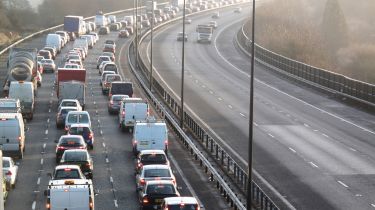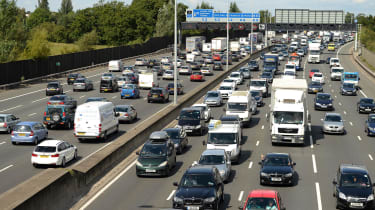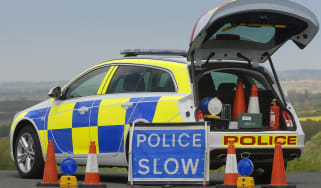Beat the Easter weekend traffic: secrets of a stress-free car getaway
The roads you should avoid and the steps you should take for trouble-free travel this Easter

The Easter break is a perfect opportunity for families to take a quick weekend away, with many planning to travel across the country by car. Congestion is often higher than usual at this time of year, but with Easter weekend 2024 coinciding with the start of the school holidays, experts are warning of potential traffic chaos.
The RAC and INRIX, a traffic analytics consultancy, predict that over 2.6 million holidaymakers will take to the roads on Good Friday, as drivers set off to make the most of the long weekend. With so many cars flooding our road network, it’s worth planning your journey in advance to avoid the worst of the traffic. It’s also more important than ever to check your car is in tip-top shape before setting off – nothing dampens the holiday excitement quite like an unscheduled breakdown.
We’ve covered everything you need to know about driving during this busy period, including which roads to avoid, when to travel, and general tips for a stress-free journey.
What is the best time to travel this Easter weekend?
It’s generally advised to travel either very late or very early in the day during periods of high road usage. Leaving as late as possible – after 8pm – on Thursday 28th and Friday 29th of March will give you the best chance of avoiding snail-paced traffic. If you’re an early bird, consider setting off before 9am on Friday morning. The same applies for Easter Monday – leaving your journey as late as possible will help you avoid the rush of traffic returning home.
We advise against driving in the middle of the day – between 10am and 3pm – as this is when traffic is expected to be at its peak.
Which roads are expected to be busiest this Easter weekend?
With so many cars hitting the road at the same time, congestion is expected to build up along many of Britain’s most important roads, bringing traffic to a crawl. And not only could this delay your plans for family fun, but extended periods in slow traffic can put your engine at increased risk of overheating.
The RAC notes that the M3 Southbound and M5 Southbound could be especially congested this Good Friday, with some journeys taking twice as long as normal. The M25 could be affected by traffic leaving London for rural idylls, and the M5 and A303 are likely to be packed with holidaymakers en route to the West Country.
The M1 is likely to be hit hard, too, as is the M6, placed under pressure by traffic leaving Birmingham and heading north, perhaps towards the Lakes. If you can use a route that avoids taking these roads, it’s recommended that you do.
It’s always worth paying attention to live traffic announcements on the radio or your navigation system – particularly those that apply to roads you’re about to join. Choosing an alternative route could make all the difference to your journey, but you can only act if you take heed of the warning.
Easter weekend survival hints

Before you get ready for the off, it’s vitally important to make sure your car is ready for the trip. Motorists are also advised to be particularly vigilant when it comes to those little mistakes that can ruin your journey – or prevent it from even commencing. We’ve put together an easy list of pre-journey checks to see your family safely on your way.
- Take a good look around your car to check for anything that looks out of place and confirm that all your lights are working as they should. If you’ve been experiencing an unexplained noise or vibration, or a strange feeling through the controls, have these checked out by a garage before committing to a long journey.
- Check your car’s tyre pressures. We’ve produced a simple guide to checking and filling your tyres and don’t forget to check your spare. It’s also a good idea to check that your tread depths are safe and legal before departing.
- With reference to your owner's manual, check that your car’s fluid levels are fine. The oil, coolant and screenwash levels are key, and many garages will help you to check these free of charge.
- When packing your car, be careful not to overload it. Your owner's manual will specify an unladen weight and a maximum gross weight for your car, and you must never exceed the latter.
- Always give yourself ‘buffer time’ on your journey. Knowing that you don’t have to reach your destination before a set time is key to having a relaxed time on the road.
- Fill your fuel tank before, or at the beginning of, your journey, as it’ll save you having to seek a refuelling opportunity later – and there’s never a petrol station when you need one.
- If you drive an EV, be aware that charging stations will be busier than usual. Top up your battery at home before setting off, and use an EV charger app to locate available chargers along your route.
- Keep a relevant road map in the car. You’ll be amazed how often sat nav can let you down and it could also prove handy if you need to contact your breakdown company.
- Make sure your phone battery is charged and, ideally, that you have a working mobile charger. If you’re on a pay-as-you-go contract, make sure you have credit. It’s worth investing in a mobile traffic news app, too.
- Carry enough spare change, or a phonecard, to allow you to use a pay phone in case of there being no mobile phone signal when you need it.
- Make sure you have a red warning triangle in the car in case of breakdown.
- On a long, family journey, it’s worth making sure that you have ample food and drink on board, as well as warm clothes in case your journey is longer – or colder – than you expect.
Finally, make sure that you have adequate breakdown and recovery cover in place for your journey, and that it’ll cover your car, its occupants and your luggage, as well as anything you’re towing or carrying. And make sure you have the right number to make contact with your recovery company if you need to.
Planning a caravan holiday? Here’s everything you need to know about towing and towing capacities…
Recommended

Speed awareness course: cost, who’s eligible, and how long does it take?

Driving in Germany: laws, tips and Autobahn speed limit

Speed limits in the UK: everything you need to know
Most Popular

New Nissan Micra is a Renault 5 in Nissan clothing

Vauxhall cuts EV prices to avoid revised luxury car tax
Tips & advice

Car dashboard warning lights: what does each symbol mean?

Electric car charging stations: public networks, charger types, apps and maps








